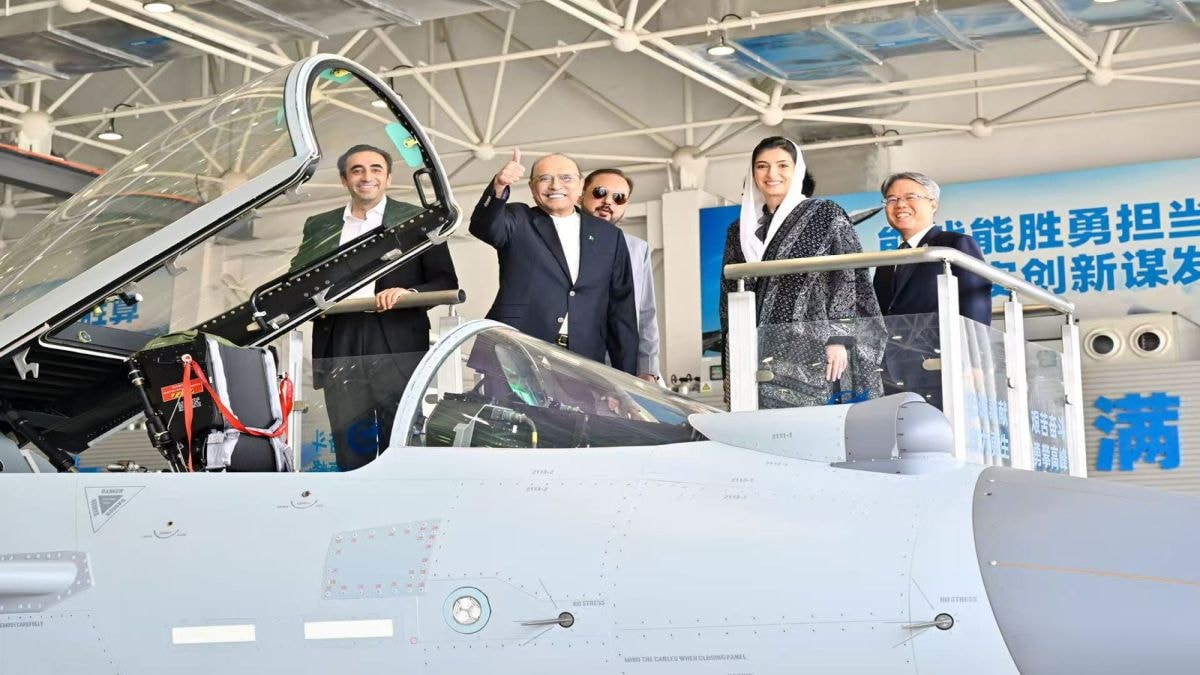How close is China to Pakistan? The answer to this question can be gauged from Pakistan President Asif Ali Zardari’s visit to the Xi Jinping-led nation.
On Friday, Zardari began a 10-day visit to China close on the heels of a five-day visit of Prime Minister Shehbaz Sharif and Army Chief Field Marshal Asim Munir.
As part of his tour, Zardari visited the advanced aircraft complex of China’s state-owned aerospace and defence giant, Aviation Industry Corporation of China (AVIC), in Chengdu, making him the first foreign leader to visit, indicating the close ties between the two nations.
But what does this mean for India, who has revived its ties with Beijing? We analyse and get you the answer.
Zardari in Pakistan
Last Friday, Pakistan President Asif Ali Zardari embarked on a 10-day visit to China, accompanied by son Bilawal Bhutto-Zardari, his daughter
Aseefa Bhutto-Zardari, Senator Saleem Mandviwalla, Pakistan’s Ambassador to China Khalil Hashmi and China’s Ambassador to Pakistan Jiang Zaidong.
On Sunday (September 14), the Pakistani president as part of his trip visited Chinese jet maker, the Aviation Industry Corporation of China in the southwestern city of Chengdu. Zardari was briefed on AVIC’s advanced capabilities, including the J-10 fighter jet, the co-production of the JF-17 Thunder with Pakistan, as well as progress in the J-20 stealth fifth-generation fighter aircraft, Zardari’s office said in a statement.
He was also briefed on unmanned aerial vehicles, fully automated units, and integrated command-and-control systems for modern multi-domain operations.
Following his visit, the Pakistani president praised the jet maker as “a symbol of China’s technological advancement and of the enduring strategic partnership between Pakistan and China”.
Significance of Zardari’s visit to AVIC
What makes Zardari’s visit to AVIC’s sprawling campus notable is that it is the first for a foreign head of state. It marks deepening security ties between Beijing and Islamabad, especially since the fighting between India and Pakistan.
In fact, it is AVIC that produces the J-10C fighter jet that played a role during the India-Pakistan military confrontation back in May. At the time, Reuters quoting American officials said Islamabad had used the Chinese-made J-10 aircraft to launch air-to-air missiles against Indian fighter jets.
Moreover, some experts had called it a “DeepSeek moment” for the Chinese weapons industry with Zhou Bo, a retired senior colonel in the Chinese People’s Liberation Army telling BBC, “The aerial fight was a big advertisement for the Chinese weapons industry. Until now, China had no opportunity to test its platforms in a combat situation.”
Now, many experts note that Zardari’s visit to China is part of Islamabad ramping up its military ties with Beijing. From 2020 to 2024, Pakistan has emerged as the largest importer of Chinese weapons, accounting for 63 per cent of all weapons exports, as per the Stockholm International Peace Research Institute (Sipri).
Sipri has noted that Pakistan’s purchase of Chinese weapons has significantly increased over the years. Between 2020 and 2024, China supplied 81 per cent of Pakistan’s arms imports. This is higher than the 74 per cent between 2015 and 2019.
And what all weapons have Pakistan imported from China? Pakistan has imported advanced fighter jets, missiles, radar and air defence systems. According to data available, as of today, the Pakistani Air Force operates 36 J-10C fighters and 161 JF-17s.
In addition to this, China has also reportedly offered to sell Pakistan its second fifth-generation fighter jet, the
J-35, according to a Pakistani government announcement posted online in June.
In mid-June, it was reported that Pakistan was in talks with China for the acquisition of cutting-edge anti-ballistic missile systems, airborne early warning and control platforms, and stealth fighters to plug the holes in its air defences exploited by India during their hostilities in May.
At the time, Walter Ladwig, an associate professor of international relations at King’s College London, noted that China’s sale of advanced stealth jets, radar aircraft, and missile defences to Pakistan was a “strategic message” for India.
India looks on…
But what does this visit mean for India and its now renewed ties with China? The Chinese Foreign Ministry has played down Zardari’s visit to AVIC and his call for stronger cooperation with China on defence production.
But experts note that it could be a reason to worry as the two look to mend broken ties. In the face of
US President Donald Trump’s tariff war with Beijing and New Delhi, both countries have renewed their ties, which plummeted following the clash of troops at the Galwan Valley in 2020.
The biggest indication of an India-China thaw was Prime Minister Narendra Modi’s visit to Tianjin in late August for the Shanghai Cooperation Organisation (SCO) Summit where he had a
bilateral meet with Chinese President Xi Jinping during which both sides reaffirmed that they are “partners not rivals”.
Moreover,
Delhi and Beijing have agreed to restore direct flights and relax visa curbs that were imposed after the 2020 clash.
The question is that as China continues to arm Pakistan with weapons and military hardware, can it be a friend of India?
Amit Bhandari, senior fellow, energy, investments and connectivity at think tank Gateway House, told CNBC earlier, “The suspicion of China runs deep in India. It is unlikely that Chinese partnership will become like the one India has with Russia or US.”
With inputs from agencies
